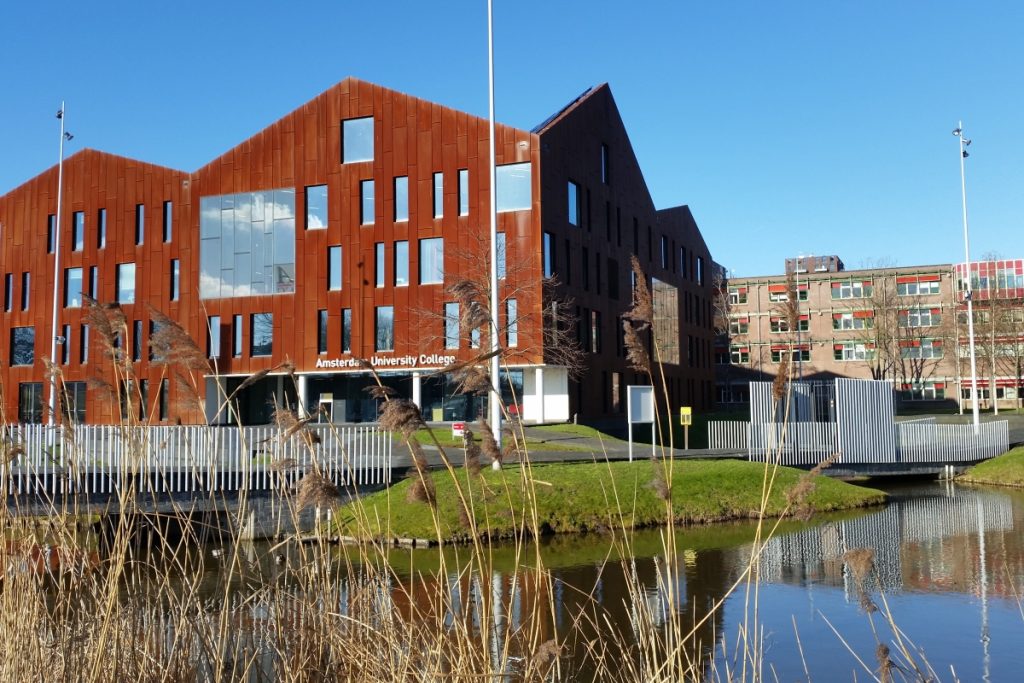On Monday, February 5, pro-Palestine protesters blocked the bridge leading to the AUC building. Staff and students were unable to enter the building, and some classes were disrupted. The AUC board called the police to remove the demonstrators.
In the afternoon, the protest continued indoors. About fifteen protesters chanted slogans and made noise throughout the building. Some of them were wearing facemasks. They demanded that the AUC board take a clearer stance in support of Palestinians. The students who received reprimands were recognized among the demonstrators.
Random selection
According to the petition, six students were individually summoned by the dean. Three of them received warnings, while the other three faced more severe measures: they have a probationary period in which they are closely watched and are instructed to write a 4000-word essay or develop a proposal for a social project. Additionally, according to the petition, they are temporarily excluded from jobs at the Amsterdam University College and from studying abroad.
The AUC student council finds the selection of these six students arbitrary. “No evidence was given to the students of why they were punished“, the vice chair of the student council says.
The student council also finds the grounds for the measures unclear. “The dean, who made the decision, refers to the code of conduct, but the evidence that these students broke it, was never shown,” she says.
Endangered social safety
Dean Martin van Hees, out of respect for the privacy of the students involved, declines to comment on individual measures taken. However, he states that the protest endangered the social safety of other students and staff and disrupted classes and exams.
“We do not allow forms of action that make primary educational processes impossible,” says Van Hees. “There are other ways to make your point. A debate where every viewpoint is heard fits much better with the academic climate we have at AUC.”
As to why these six students were singled out, he states that only they were recognized with certainty, as most of the demonstrators wore facemasks. Van Hees states that the punished students were informed about which rules they broke and in the letter they received, their right to appeal was pointed out.
Abuse of power
The student council also accuses the dean of abuse of power in the petition. “The dean alone decides whether behavior violates the code of conduct and what measures are appropriate. In the dean’s discussions with the affected students, it was not clear why measures were taken against them specifically and on what basis,” the council states.
The student council has previously raised concerns that the AUC’s rules of conduct are not transparent and democratic. The council advocates for a system that is more inclusive, transparent, and democratic.
No Free Debate
Van Hees states that the AUC has organized a series of debates on the war in Gaza. The dean also says that the AUC’s Decentralised Crisis Team attempted to engage in dialogue with the protesting students and to create a safe space for debate, but blocking educational spaces and preventing access for staff and students are not part of a safe debate in his view.
“The way action is taken with face masks and a lot of noise creates a sense of insecurity among some of our staff and students,” says Van Hees.
In practice, the student council finds the culture at AUC to not be free. The student council sent a letter with unsolicited advice to the dean, in which it states there is a culture of suppression and discipline at the AUC.
The student council believes that the board focuses too much on a meta-level debate on social safety: “They want to talk about social safety, seperate from any historical and cultural context, but that’s impossible because that context is an integral part of social safety, especially now that it concerns Gaza.”
